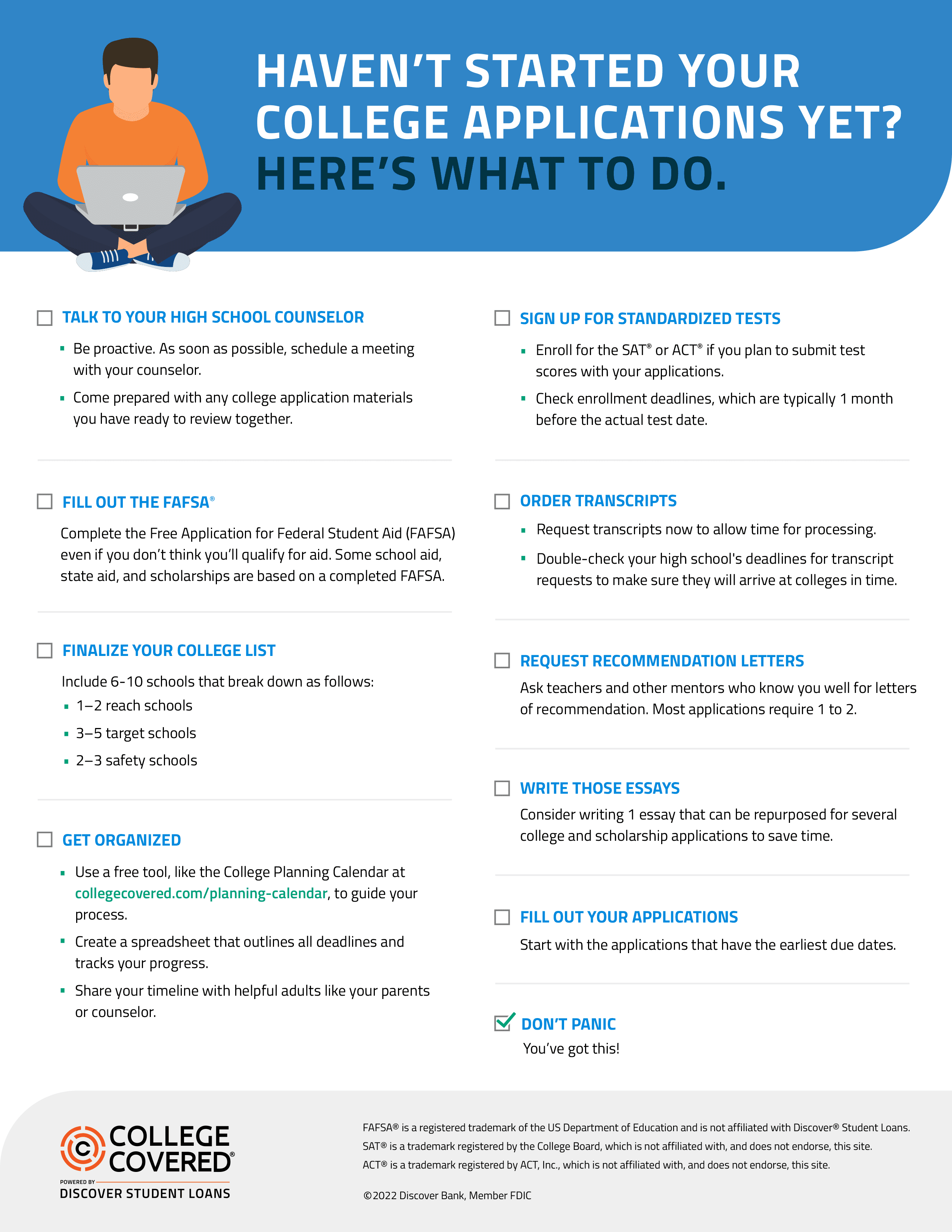You planned to start your college applications early in the fall, leaving yourself plenty of time to prepare.
But maybe classes got too busy, your part-time job limited your availability after school, or you’ve been dealing with a bit of senioritis. Now those early January submission deadlines are fast approaching, and you’re not quite certain how to get all the necessary parts in order.
Know that you are not alone, and it’s not too late. Use this helpful guide to put together a standout application with the time you have left.
Get Organized
First, make a list of upcoming deadlines and tasks you still need to complete for each application. Arrange your list so you’re prepared to tackle the tasks that require the most time first (e.g., essays, letters of recommendation, school transcripts). To keep yourself organized, use the College Planning Calendar to keep track of what’s on your college application checklist.
Ask (Nicely!) for What You Need
Whether you’ve been feeling overwhelmed by the process, didn’t realize how much time your application would take or were sidetracked by an emergency, Wanda Montañez, EdD, former senior director of college success for Chyten Education, suggests remaining calm and being transparent. “When asking a teacher or counselor for a letter of recommendation, be honest about the reasons you have for working so closely to the deadline,” she says.
Once you have an idea of who you’d like your recommenders to be, make the initial request in person, if at all possible. Acknowledge that you’re asking late, briefly explain why, and then ask if your teacher or counselor would be comfortable writing a letter on your behalf. If they agree, follow up by email. Start by thanking them for agreeing to write a recommendation, especially on short notice. Then provide a helpful list of academic accomplishments, major projects you’ve completed, areas of interest, and extracurriculars they may want to mention—all of which will help them personalize your letter. Finally, be polite but clear about when you need the letter signed, sealed, and delivered.
Request Your Transcripts
When it comes to transcripts, keep at least five official copies on hand in case you need them when the office is particularly busy. Request the five transcripts now—plus the number you need for the schools on your list—so you can check this task off your list. Most of the time, official transcripts come in a sealed envelope and should not be opened by the student so the college knows it’s an official copy.
Some high schools have a policy not to release official transcripts to the student, but they will send them directly to the college. If that’s the case, make sure to have an organized list of schools and addresses ready to go. Remember that the records office is often overwhelmed with requests at this time of year, so be patient and gracious when you stop by.
Tackle Your Essay
Next, begin working on your main essay, any required supplemental essays, and/or any short-essay questions. Montañez recommends predetermining the amount of hours you need to put into writing and editing your essays effectively. “Whether this is done in one day or over the course of a few days, you’ll likely need more time than you think, so be generous in your estimate.”
Struggling to get started? Accept that time spent brainstorming is not time wasted. Montañez suggests taking approximately 30 minutes to jot down any ideas and check essay prompts.
Once you have a draft in hand, allow yourself a break. “Put it away and return to it with fresh eyes,” says Montañez. “Adjust for grammar, flow, and length. Finally, identify someone in your life such as a teacher, counselor, or coach who can proofread your essay and provide timely feedback.”
Advocate for Yourself
First-generation college students, immigrant students, or those otherwise applying to college without parental assistance may find themselves especially lost during the application process. Andrea Burkholder, an office assistant for the Department of Nursing at Eastern Mennonite University, found herself in a similar situation when applying to Ferrum College in Virginia. She suggests reaching out to schools’ academic advisors or registrars to ask whether exceptions can be made to extend the admission deadline. While most schools won’t acquiesce, there may be some exceptions, such as at small private schools that are under-enrolled for the following academic year. This was the case for Burkholder, who was able to successfully apply and gain acceptance to Ferrum College even after the official admission deadline had passed.
If you’re making a phone call to inquire about deadline leniency, it may help to prepare a short script ahead of time. Offer a clear reason for why you’re running behind, and keep it short and to the point. Most importantly, treat the person you’re talking to kindly and respectfully—the same way you’d like to be treated at your job. The assistance or understanding of a single person in the advising or admissions departments can be enough to help propel you forward to the finish line.
Keep Your Options Open
If you’re feeling the stress of those looming deadlines, Montañez reminds students that these are not, in fact, the deadlines for all schools. “If completing an application by then isn’t possible, consider other options,” she says. You might explore enrolling in with the intent to transfer to a four-year school or taking a gap year to travel, work, or complete an internship.
Your timeline may be tight, but that doesn’t mean finishing your applications is impossible. Remember to stay calm, remain focused, and put your best foot forward.





